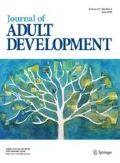Abstract
This study investigated the relationships among mindfulness, marital satisfaction, and perceived spousal similarity. All 95 subjects responded to a questionnaire measuring each of these variables, and an additional series of demographic variables. A significant positive relationship was found between mindfulness and marital satisfaction, with no statistically significant relationship found between perceived spousal similarity and marital satisfaction. There was a stronger correlation between mindfulness and marital satisfaction than the correlation between marital satisfaction and any of the other variables, including similarity. These results carry meaningful implications for the role of mindfulness techniques within the context of building and maintaining happy marital relationships and general well-being.
Similar content being viewed by others
References
Bahr, S. J., Chappell, C. B., & Leigh, G. K. (1983). Age at marriage, role enactment, role consensus, and marital satisfaction. Journal of Personality and Social Psychology, 43, 1088–1097.
Blum, J. S., & Mehrabian, A. (1999). Personality and temperament correlates of marital satisfaction. Journal of Personality, 67, 93–125.
Bohlander, R. W. (1999). Differentiation of self, need fulfillment, and psychological well-being in married men. Psychological Reports, 84, 1274–1280.
Bouchard, G., Lussier, Y., & Sabourin, S. (1999). Personality and marital adjustment: Utility of the five-factor model of personality. Journal of Marriage and the Family, 61, 651–660.
Bruch, M. A., & Skovholt, T. (1985). Congruence of Holland personality type and marital satisfaction. Measurement and Evaluation in Counseling and Development, 18, 100–107.
Buss, D. M. (1991). Conflict in married couples: Personality predictors of anger and upset. Journal of Personality, 59, 663–688.
Buunk, B. P., & Mutsaers, W. (1999). Equity perceptions and marital satisfaction in former and current marriage: A study among the remarried. Journal of Social and Personal Relationships, 16, 123–132.
Caspi, A., & Herbener, E. S. (1990). Continuity and change: Assortative marriage and the consistency of personality in adulthood. Journal of Personality and Social Psychology, 58, 250–258.
Fields, N. (1983). Satisfaction in long-term marriages. Social Work, 28, 37–41.
Gill, D. S., Christensen, A., & Fincham, F. D. (1999). Predicting marital satisfaction from behavior: Do all roads really lead to Rome? Personal Relationships, 6, 369–387.
Gottman, J. M. (1994). What predicts divorce? The relationship between marital processes and marital outcomes. Hillsdale, NJ: Lawrence Erlbaum Associates, Inc.
Gottman, J. M., & Krokoff, L. J. (1989). Marital interaction and satisfaction: A longitudinal view. Journal of Consulting and Clinical Psychology, 57, 47–52.
Hjemboe, S., & Butcher, J. N. (1991). Couples in marital distress: A study of personality factors as measured by the MMPI-2. Journal of Personality Assessment, 57, 216–237.
Holden, J. M. (1991). The most frequent personality priority pairings in marriage and marriage counseling. Individual Psychology, 47, 392–398.
Johnson, D. R., & Booth, A. (1998). Marital quality: A product of the dyadic environment or individual factors? Social Forces, 76, 883–904.
Kaslow, R., & Robinson, J. A. (1996). Long-term satisfying marriages: Perceptions of contributing factors. The American Journal of Family Therapy, 24, 153–170.
Kelly, E. L., & Conley, J. J. (1987). Personality and compatibility: A prospective analysis of marital stability and marital satisfaction. Journal of Personality and Social Psychology, 52, 27–40.
Kim, A., Martin, D., & Martin M. (1989). Effects of personality on marital satisfaction: Identification of source traits and their role in marital stability. Family Therapy, 16, 243–248.
Kosek, R. B. (1996). The quest for a perfect spouse: Spousal ratings and marital satisfaction. Psychological Reports, 79, 731–735.
Langer, E. J. (1989). Mindfulness. Reading, MA: Addison-Wesley Publishing Company.
Langer, E. J. (1997). The Power of mindful learning. Reading, MA: Addison-Wesley Publishing Company.
Langer, E. J. (2001). Personal outlook scale. Manuscript submitted for publication.
Langer, E. J. (2002). Well-being: Mindfulness versus positive evaluation. In C. R. Snyder (Ed.), Handbook of positive psychology. Oxford University Press.
Lester, D., Haig, C., & Monello, R. (1989). Spouses' personality and marital satisfaction. Personality and Individual Differences, 10, 253–254.
Lewak, R. W., Wakefield, J. A., Jr., & Briggs, P. F. (1985). Intelligence and personality in mate choice and marital satisfaction. Personality and Individual Differences, 6, 471–477.
MacEwen, K., & Barling, J. (1993). Type a behavior and marital satisfaction: Differential effects of achievement striving and impatience/irritability. Journal of Marriage and the Family, 55, 1001–1010
Mackey, R. A., Diemer, M. A., & O'Brien, B. A. (2000). Conflict-management styles of spouses in lasting marriages. Psychotherapy, 37, 134–148.
Merves-Okin, L., Amidon, E., & Bernt, F. (1991). Perceptions of intimacy in marriage: A study of married couples. The American Journal of Family Therapy, 19, 110–118.
Nemechek, S., & Olson, K. R. (1996). Personality and marital adjustment. Psychological Reports, 78, 26.
Nemechek, S., & Olson, K. R. (1999). Five-factor personality similarity and marital adjustment. Social Behavior and Personality, 27, 309–318.
Pasupathi, M., Carstensen, L. L., Levenson, R. W., & Gottman, J. M. (1999). Responsive listening in long-married couples: A psycholinguistic perspective. Journal of Nonverbal Behavior, 23, 173–193.
Plechaty, M. (1987). Perceptual congruence of five attitudes among satisfied and unsatisfied couples. Psychological Reports, 61, 527–537.
Richard, L. S., Wakefield, J. A., Jr., & Lewak, R. (1990). Similarity of personality variables as predictors of marital satisfaction: A Minnesota Multiphasic Personality Inventory (MMPI) item analysis. Personality and Individual Differences, 11, 39–43.
Sherman, R. G., & Jones, J. H. (1994). Exchange on the Myers-Briggs type indicator: A response to the article on “The validity of the Myers-Briggs type indicator for predicting expressed marital problems.” Family Relations, 43, 94–95.
Winch, R. F., Ktsanes, T., & Ktsanes, V. (1954). The theory of complementary needs in mate selection: An analytic and descriptive study. American Sociological Review, 19, 241–249.
Zimmerman, J. L., & Dickerson, V. C. (1993). Separating couples from restraining patterns and the relationship discourse that supports them. Journal of Marital and Family Therapy, 19, 403–413.
Author information
Authors and Affiliations
Corresponding author
Rights and permissions
About this article
Cite this article
Burpee, L.C., Langer, E.J. Mindfulness and Marital Satisfaction. J Adult Dev 12, 43–51 (2005). https://doi.org/10.1007/s10804-005-1281-6
Issue Date:
DOI: https://doi.org/10.1007/s10804-005-1281-6




